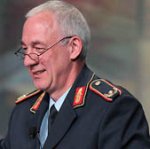Space Foundation News
Panel Looks at International Military Collaboration for Security
Written by: developer
 The International Military Collaboration panel, one of the second two concurrent panels held April 18 at the 28th National Space Symposium, featured military leaders from around world. Here are some key points:
The International Military Collaboration panel, one of the second two concurrent panels held April 18 at the 28th National Space Symposium, featured military leaders from around world. Here are some key points:
Col. Inaky Garcia-Brotons, chief of staff, French Joint Space Command: The benefits of collaboration include protecting the global space environment, allowing access to otherwise unaffordable capabilities and strengthening partnerships and alliances. Observation, space situational awareness and satellite communications are good examples of collaboration.
Air Chief Marshal (Rtd) Sir Joe French CBE, non-executive director, Surrey Satellite Technology Limited: It is difficult to allocate funds to foreign capabilities in election years, making it critical to have realistic collaboration plans.
Brig. Gen. Dr. Ansgar Rieks, assistant chief of staff, Future Development Armed Forces, German Ministry of Defence: The German military has been reoriented, which was both a challenge and an opportunity. "Doing more with less" may not be possible, creating a need for multilateral programs. The German National Space Strategy holds space as the key for globalization, a knowledge-based society, climate change monitoring and security.
Maj. Gen. (Sel.) James K. (Kevin) McLaughlin, USAF, director - space operations, deputy chief of staff for operations, plans and requirements, U.S. Air Force: Combined operations are important because they allow synchronization of military operations, particularly in the area of space situational awareness. The potential dangers of the re-entry of the Phobos-Grunt spacecraft is an example of the need for sharing information.
The panel was moderated by William (Bill) V. Parker, special advisor - international affairs, Space Foundation.
See photos here. See video here.
Pictured: Rieks


